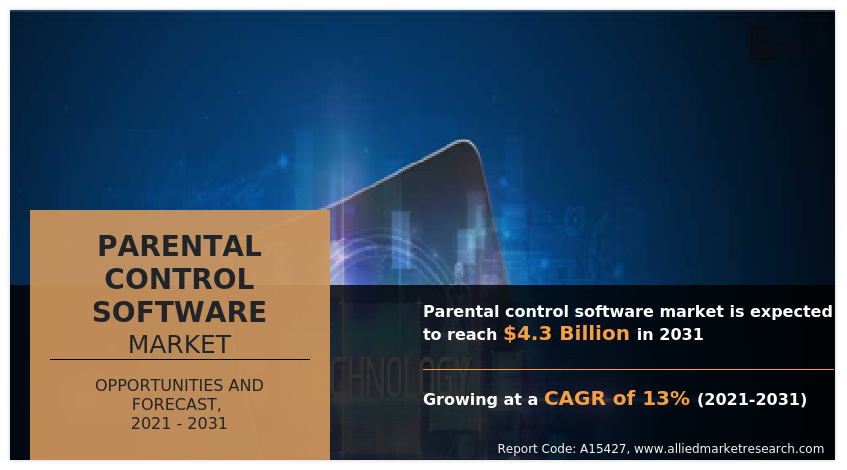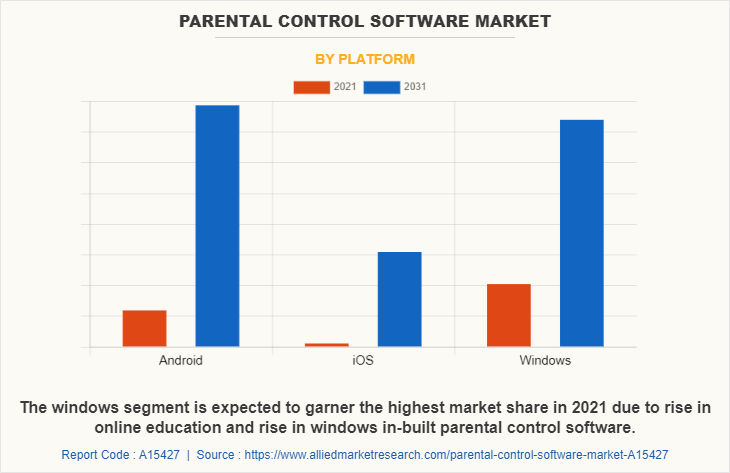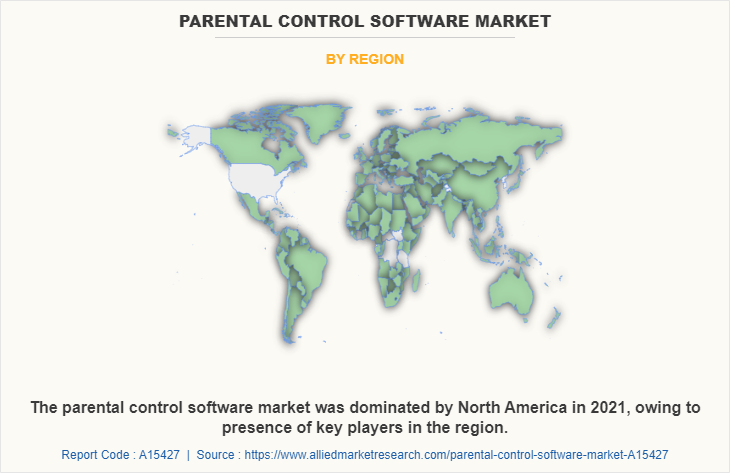Parental Control Software Market Overview
The global parental control software market size was valued at USD 1.3 billion in 2021 and is projected to reach USD 4.3 billion by 2031, growing at a CAGR of 13% from 2021 to 2031.
Rise in government regulations to standardize digital content for children's safety is driving the parental control software market growth. The use of parental control tools enables parents to limit children's exposure to unwanted social media posts and helps in protecting children from unethical practices such as cyberbullying. In addition, increase in social media usage and exposure to internet content among children and growing penetration of personal device access for kids. Thus, these factors drive the growth of the market size. However, high initial cost and data privacy concerns of software is hampering the growth of the parental control software market. On the contrary, growing demand for advanced AI/ML-powered parental control software will provide major lucrative opportunities for growth of the market.
Key Market Insights
- By platform, android segment is anticipated to register the highest growth rate in industry during the forecast period.
- By deployment mode, the on-premise segment led the parental control software market in terms of revenue in 2021.
- By region, Asia-Pacific is anticipated to register highest growth rate during the forecast period.
Market Size & Forecast
- 2031 Projected Market Size: USD 4.3 Billion
- 2021 Market Size: USD 1.3 Billion
- Compound Annual Growth Rate (CAGR) (2021-2031): 13%

How to Describe Parental Control Software
Parental control software are tools that allow parents to set controls on their children’s internet use. This prevents children from accessing inappropriate online content via smartphones, tablets, and computers. Parental controls software is located on Vista's control panel, where a user can access an account and monitor their children's activity or behavior. This helps to create a customized checklist to set parental controls on each device, especially for family users. Moreover, many schools have incorporated laptops, computers, and tablets into their syllabus, which has encouraged the requirement to install tracking tools to filter content and limit sites.
Parental Control Software Market Segment Review
The parental control software market is segmented on the basis of platform, deployment mode and application. By platform, it is segmented into android, iOS and windows. By deployment mode, it is segmented into on-premises and cloud. By application, it is segmented into residential and educational institutes. By region, it is analyzed across North America, Europe, Asia-Pacific, and LAMEA.

By platform, the windows segment dominate the market in 2021. This is attributed to the rapid expansion of digital content: the digital content available on various platforms, including websites, social media networks, and app stores, is expanding rapidly. This is providing a major impetus to the growth of the windows based parental control software. However, android segment is anticipated to register the highest growth rate in parental control software industry during the forecasted period due to the rise in a number of android based smartphones and TV.

By region, North America attained the highest growth in 2021. This is attributed to the presence of industry players with best-in-class equipment and service to offer. Moreover, rise in online learning in the U.S. is also boosting the parental control software industry growth. However, Asia-Pacific is anticipated to register highest growth rate in parental control software market forecast due to technological advancements and rise in cyber fraud among children.
What are the Top Impacting Factors in Market
Market Drivers
Growing Penetration of Personal Device Access for Kids
In recent years, smartphones and tablets have gained immense popularity among consumers and have become an integral part of human lifestyle, including kids. Moreover, the affordable rates for internet access and proliferating smart devices like smartphones, tablets, and computers have bolstered the growth of the parental control software market. In addition, increasing digitalization and availability of smart devices at affordable prices have impacted the growth of the market in recent times. Furthermore, with the growing adoption of smartphone among kids, the adoption of parental control software also will be increasing in the coming years.
Rise in Government Regulations to Standardize Digital Content for Children's Safety
Online content offers a variety of educational, social, and entertainment benefits to kids. However, there are also perceived dangers, especially with the internet content and the behavior and interaction risks associated with internet-facilitated peer-to-peer communication. In addition, the use of parental control tools enables parents to limit children's exposure to unwanted social media posts and helps in protecting children from unethical practices such as cyberbullying.
Moreover, governments across countries focus on ensuring child safety regulations for digital media applications. For instance, in February 2021, the Indian Government announced a new set of regulations and guidelines to regulate digital content. In these rules and guidelines, OTT platforms must implement parental lock solutions for those above the age of 13 for the classified range.
Increase in Social Media Usage and Exposure to Internet Content Among Children
Children use social media platforms for sharing media content and social networking. These social platforms include WhatsApp, Facebook, Twitter, Instagram, YouTube, and Snapchat. Moreover, these social media site requires personal data for creating an online profile. Thus, this can be harmful to the children due to increasing cases of cybercrime, social media addiction, and health issues like sleep disorder and anxiety.
In addition, the increasing usage of social media exposes children to too much-targeted marketing and advertising, and breaches of personal information like phone number, location, date of birth, among other things. This can affect the lives of children; hence the parental control software can be used to prevent children from this exposure. Therefore, the increasing usage of social media recognizes the need for parental control software, which helps fuel the growth of the parental control software market share.
Restraint
High Initial Cost and Data Privacy Concerns of Software
The software provides cutting-edge functionality and advanced applications at a high cost. For certain parents, this price could be prohibitively expensive. Purchasing parental control software could be out of budget for a few parents. Moreover, many websites provide innovative functionality at the high expense of parental control solutions. Thus, the high initial price is a crucial limitation for adopting parental control tools.
In addition, the software can be attacked with malware and is subjected to data breaches. This software can contain an infection or pose other threats to phone or computer devices, resulting in significant data loss. Hence, these factors are expected to hinder the parental control software market growth over the forecast period.
Cyber Security Issues and Lack of Awareness
Due to the COVID-19, cybercrime and cybersecurity issues have increased by 600%. Flaws in network or software security is a weakness that hackers exploit to perform unauthorized actions within a system. Moreover, to minimize the impact of the cyber threats faced by the kids, parents are advised to use parental control software to monitor their ' 'kid's activity. This software is effective if constructed efficiently but due to weak architectures of the software, hackers tend to bypass the software's defenses, resulting in cyber-attacks, cyberbullying, and loss of personal information. Therefore, increasing cyber-threats is expected to impede parental control software market growth.
In addition, lack of proper guidance for the usage and lack of awareness among the parents is the major restraining factor that hinders the growth of the parental control software market in some countries. Especially in the urban and rural areas where parents are unaware of operating the smart devices fail to realize the importance of installing the parental control software in their child's devices.
Opportunity
Growing Demand for Advanced AI/ML-Powered Parental Control Software
Parental control solutions aim to access and control activities on digital devices and tools. Several features such as Family Link, screen time management, and program management have been introduced by parental control software or apps in the last few years, and various platforms such as YouTube, Facebook, etc. have adopted and implemented parental controls solutions to provide better and safer services. Smartphones provide access to various social media platforms, as a result, parental control solutions are much needed, as they affect not only sleep patterns but also academic performance.
Moreover, the adoption of advanced technologies such as AI and ML helps in providing advanced monitoring features for parents to monitor the activities of children’s. All these benefits of AI and ML is providing ample growth opportunity for parental control software market growth.
Which are the Leading Companies in Parental Control Software
The following are the leading companies in the market.
McAfee
LLC
Microsoft
AO Kaspersky Lab
SentryPC
Verizon
Mobile Fence
Google LLC
Cisco Systems
Inc.
SafeDNS, Inc
AT&T
Market Landscape and Trends:
Growing internet addiction in the young population is a leading reason that has boosted the growth of the parental control software market. The rise in the screen time of the children has resulted in higher concerns for the parents related to kids’ physical, social and emotional health, which promotes the use of the parental control software. Moreover, the product developments and ongoing research that brought in the innovations in the market are expected to boost the growth of the market. For instance, D-link has announced the launch of its latest Wi-Fi router that enables parents to control their kids. Such features in the Wi-Fi router will provide ample opportunity for the parental control software market to grow.
In addition, the affordable rates for internet access and proliferating smart devices such as smartphones, tablets, and computers have bolstered the growth of the parental control software market. Furthermore, the biggest benefit of using a parental control software is the peace of mind and inner satisfaction and experience what kid is accessing safe content and it protected from harmful cyber threats that can prove dangerous for their well-being. Therefore, these are the major market trends for parental control software market.
What are the Key Benefits for Stakeholders
This report provides a quantitative analysis of the market segments, current trends, estimations, and dynamics of the parental control software market analysis from 2021 to 2031 to identify the prevailing parental control software market opportunities.
Market research is offered along with information related to key drivers, restraints, and opportunities.
Porter's five forces analysis highlights the potency of buyers and suppliers to enable stakeholders to make profit-oriented business decisions and strengthen their supplier-buyer network.
In-depth analysis of the parental control software market segmentation assists to determine the prevailing market opportunities.
Major countries in each region are mapped according to their revenue contribution to the global market.
Market player positioning facilitates benchmarking and provides a clear understanding of the present position of the market players.
The report includes the analysis of the regional as well as global parental control software market trends, key players, market segments, application areas, and market growth strategies.
Parental Control Software Market Report Highlights
| Aspects | Details |
| Market Size By 2031 | USD 4.3 billion |
| Growth Rate | CAGR of 13% |
| Forecast period | 2021 - 2031 |
| Report Pages | 230 |
| By Platform |
|
| By Deployment Mode |
|
| By Application |
|
| By Region |
|
| Key Market Players | Google LLC, Mobile Fence, SafeDNS, Inc., Verizon, McAfee, LLC, Microsoft, Cisco Systems, Inc., AT&T, AO Kaspersky Lab, SentryPC |
Analyst Review
Parental controls are software that permits parents to track their kid’s internet utilization, block and filter content and websites, restrict their online times, and observe their browsing history and communications. Many schools have incorporated laptops, computers, and tablets into their syllabus, which has encouraged the requirement to install tracking tools to filter content and limit sites.
Furthermore, market players are adopting acquisition strategies for enhancing their services in the market and improving customer satisfaction. For instance, in August 2021, Norton LifeLock Inc. entered into a partnership with Avast. The main objective behind this partnership was to strengthen digital security and privacy. Moreover, it also aimed to improve cloud-based software solution portfolios such as parental control software. This partnership helped both the companies to grow their market in terms of revenue and attract more customers.
Some of the key players profiled in the report include AO Kaspersky Lab, AT&T, Cisco Systems, Inc., Google LLC, McAfee, LLC, Microsoft, Mobile Fence, SafeDNS, Inc., SentryPC and Verizon. These players have adopted various strategies to increase their market penetration and strengthen their position in the parental control software market.
The global Parental Control Software Market size was valued at USD 1.3 billion in 2021, and is projected to reach USD 4.3 billion by 2031
The global Parental Control Software Market is projected to grow at a compound annual growth rate of 13% from 2021-2031 to reach USD 4.3 billion by 2031
The key players that operate in the Parental Control Software Market such as AT&T, Google LLC, Cisco Systems, Inc., AO Kaspersky Lab, SentryPC, McAfee, LLC, Mobile Fence, SafeDNS, Inc., Verizon, Microsoft
By region, North America attained the highest growth in 2021.
Growing Penetration of Personal Device Access for Kids, Rise in Government Regulations to Standardize Digital Content for Children's Safety, Increase in Social Media Usage and Exposure to Internet Content Among Children
Loading Table Of Content...



